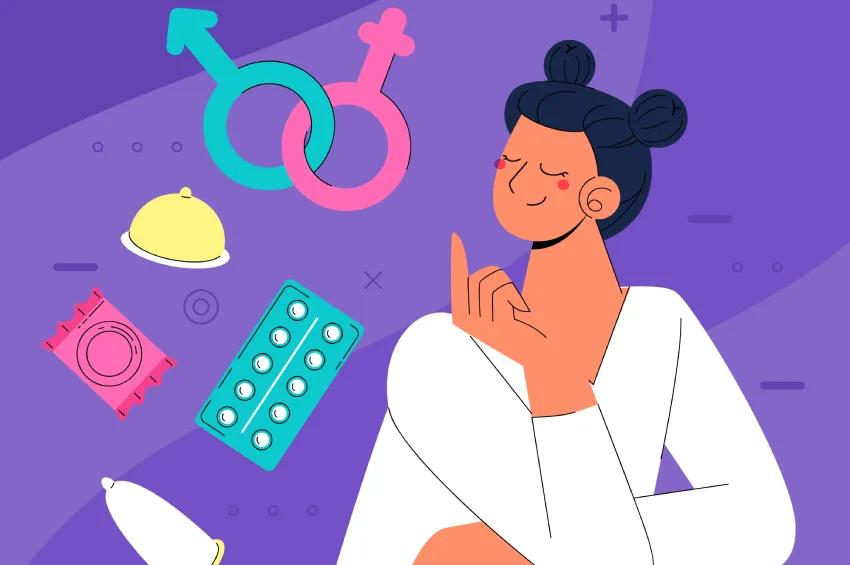
Empowering Women in India through Contraception: A Path to Gender Equality
By Saheli Plus | December 2, 2024

Women's empowerment and gender equality are among the sustainable development goals formulated by the United Nations. These indicators are considered the yardstick for societal progress. Women in India face numerous challenges every day, though India has made significant progress in education, public health, and employment.
For instance, according to the World Bank, between 1951 and 2003, the literacy rate among women increased from around 9% to 77%; during that same period of time, maternal mortality came down from 2000 per 1,00,000 to 97 per 1,00,000. On the flip side, 92% of women today participate in unpaid work, spending 7.5 hours on household chores and caring for the children and the elderly. So, it is evident that there are areas that require urgent attention to improve the lives of women in India.
This article lists the problems that women in India face daily and explores how contraceptives empower them when it comes to reproductive rights and making informed decisions about their health and well-being.
What are the Challenges to Women’s Empowerment in India?
1. Gender disparity in employment
Equality starts with educational qualifications and employment. Gender disparity in higher education has gradually gone down. According to the survey by the HRD ministry, the gender gap in enrolment in higher education has narrowed over the years. Though more women have become educated and employable, not everyone gets to build a career over the years. Childbirth is one of the major reasons behind women not returning to work. According to a report titled “Predicament of Returning Mothers,” released by Ashoka University, 50% of working women in India leave their jobs to take care of their children. 48% of those who return to work drop out within four months of rejoining work. Leaving a job and taking a break to raise children limits women from gaining access to job opportunities, stable income, and decision-making power.
2. Limited access to healthcare services
Women in India face barriers to accessing healthcare services, including reproductive health care, as inferred from the NFHS-5. When women cannot access healthcare services for reproductive health, they have no control over their fertility and right to good health.
3. Gender-based violence
Gender-based violence poses a significant threat to women's physical and mental well-being. The National Crime Records Bureau (NCRB) reports on crimes against women, highlighting the prevalence of gender-based violence in India. Gender-based violence can range from domestic violence to sexual assaults and more. The threats of violence that women face every day restrict their freedom and infringe on their rights. Eliminating gender-based violence requires addressing the deep-rooted gender inequality.
4. Restricted reproductive rights
According to the NFHS-5, only 66% of women in India, as of 2019-21, had access to some kind of contraception/family planning method. This clearly indicates that women have restrictions on their reproductive rights. It prevents them from making decisions on when they can have a child. These conditions force them through childbirth without enough intervals, impacting their health and well-being.
In What Ways Can Contraception Empower Women?
1. Child spacing and empowerment
Family planning is key to having children at the right time when a family is financially stable and when the family can raise a child without sacrificing the mother’s career.
Access to contraceptives enables women to take control of family planning and time childbirth correctly, giving them a higher chance of saving their career and financial independence. According to the National Family Health Survey (NFHS-4), women who use contraception are more likely to complete their education, join the workforce, contribute to the family economically, and gain economic independence and decision-making power.
2. Contraception brings healthcare to women
Many contraception methods such as IUDs, sterilisation, and some OCPs necessitate women to visit a clinic. So, choosing contraceptives introduces them to family planning counselling and enables them to become knowledgeable, gain access to a variety of contraceptive methods, and make informed decisions on their health and well-being. The National Adolescent Health Mission (RKSK) further introduces peer educators linked to the Adolescent Friendly Health Clinics (AFHCs) to impart information to young people on sexual and reproductive health, refer them to health facilities, and prevent injuries and violence, thus enabling healthcare and reducing gender-based violence.
Further, contraception promotes better health outcomes for women and children by reducing maternal and infant mortality rates, preventing unintended pregnancies, and enabling women to access essential healthcare services.
3. Access to contraception helps women get their reproductive rights
Ensuring access to contraception enables women to exercise control over their fertility and make informed decisions about their reproductive health and lives. Expanding access to contraception further can help address these barriers and promote women's reproductive rights and autonomy.
4. Contraception can reduce vulnerability to domestic violence
Child spacing and family planning give women the control over their reproductive rights. As a result, women can get their financial independence and even achieve a reversal of roles, promoting gender equality. Empowerment through contraception can reduce women’s vulnerability to violence and promote autonomy.
Key Takeaways
Contraception stands as a cornerstone of women's empowerment in India, offering women the opportunity to exercise control over their reproductive health and make choices that align with their aspirations and well-being. Promoting access to contraception is not only a moral imperative but also a strategic pathway towards achieving sustainable development goals and building a more equitable and inclusive society. So, safe, simple, and effective contraception is indispensable.
Saheli, a Safe OCP with No Side Effects
Saheli is the world’s only non-steroidal oral contraceptive pill that is completely free from all the side effects. Saheli is trusted by millions of women in India for planning the family and child spacing.
FAQs
1. Why is contraception important for women?
Contraception is important for women because it gives them control over their reproductive health and allows them to make informed choices about when to have children.
2. What is the role of family planning in women's empowerment?
Family planning enables women to plan the family and space their pregnancies. This in turn empowers them to pursue education, get a job, achieve financial independence, and make decisions about their own lives.
3. What are the roles of contraception?
- Prevents unintended pregnancies
- Promotes women's health by giving them control over birth spacing
- Empowers them to make decisions about their reproductive futures
- Contributes to gender equality by allowing women to participate fully in society
4. What is the role of empowered women?
- Participate in the society
- Gain financial independence and contribute to economic growth and social development
- Are aware of their right to good health and reproductive rights
- Make informed decisions about their health, education, and family planning
Recent Blogs
Pre-Conception Planning for a Healthy Pregnancy
By Saheli Plus | January 22, 2026
Managing Chronic Illness and Reproductive Health
By Saheli Plus | January 6, 2026
Emotional Wellbeing and Contraceptive Choice
By Saheli Plus | December 19, 2025
Postpartum Fertility: Knowing When You are Fertile Again
By Saheli Plus | December 4, 2025
Missed Doses and Contraceptive Failure: Prevent Their Impact on Pregnancy with Saheli Plus
By Saheli Plus | November 25, 2025
Aligning Life Goals with Your Biological Clock
By Saheli Plus | November 4, 2025
Myths and Facts: Saheli Plus and Its Impact on Your Sex Life
By Saheli Plus | October 27, 2024
The Pill for Most Women: Saheli Plus for Breastfeeding Mothers
By Saheli Plus | October 6, 2025
Reversing Contraception: Here's How You Can Conceive After Using Saheli Plus
By Saheli Plus | September 29, 2025
Saheli Plus and OCP Drug Interactions - Everything You Need to Know
By Saheli Plus | September 5, 2024
